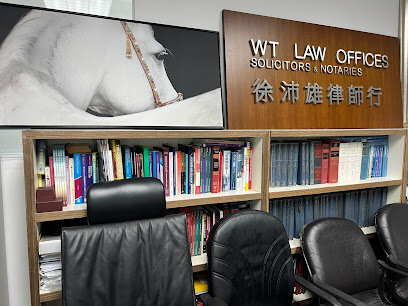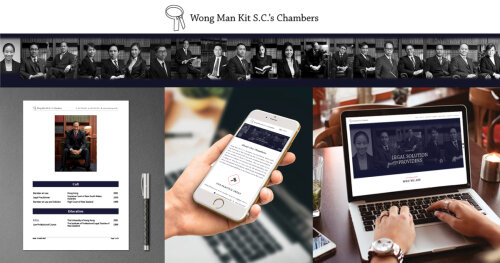Best Faith-Based Law Lawyers in Central
Share your needs with us, get contacted by law firms.
Free. Takes 2 min.
List of the best lawyers in Central, Hong Kong
About Faith-Based Law in Central, Hong Kong
Faith-Based Law in Central, Hong Kong refers to the legal principles and practices that are influenced by religious beliefs and values. Given Hong Kong's diverse population, various faiths can influence legal matters, especially in areas such as family law, personal disputes, and contractual agreements that may be governed by religious norms. While Hong Kong's legal system is primarily secular and based on common law, respect for religious beliefs in specific circumstances can create a need for specialized legal understanding and advocacy.
Why You May Need a Lawyer
There are several common scenarios where someone might require legal assistance in the context of Faith-Based Law:
- Disputes arising from religious family norms, including marriage, divorce, and inheritance.
- Conflicts within religious organizations regarding governance or property issues.
- Discrimination or alleged breaches of religious freedoms and rights.
- Implementing religious practices within the legal framework of Hong Kong, especially for contracts and business dealings.
- Legal compliance for religious non-profits and organizations.
Local Laws Overview
While Hong Kong operates under a secular legal system modeled largely after the British common law system, religious practices are protected under the Basic Law and Bill of Rights Ordinance, which guarantees freedom of religion. Understanding local laws in the context of Faith-Based Law involves navigating both the secular legal system and the accommodations allowed for religious practices:
- Marriage Ordinance: Recognizes marriages conducted by religious institutions, provided they meet the legal criteria set by Hong Kong law.
- Incorporation of Religious Bodies Ordinance: Governs the formation and management of religious entities as legal corporations.
- Equal Opportunities and Anti-Discrimination: Provides a framework to handle religious discrimination in employment and public services.
- Charitable Donations: Address the management and taxation of religious charities.
Frequently Asked Questions
How does Hong Kong law accommodate religious practices?
Hong Kong's legal system allows for the integration of religious practices, as long as they do not conflict with public policy or the rights of others. Many personal status laws, like marriage and inheritance, respect religious customs if they are registered under local law.
Can religious values influence legal documents, like wills or contracts?
Yes, religious beliefs can be reflected in legal documents, but they must comply with Hong Kong law to be enforceable. Legal advice is recommended to ensure they are valid in the eyes of the court.
What are my rights if my religious freedoms are restricted in Hong Kong?
The Basic Law protects religious freedom. Individuals can seek legal recourse if they believe their religious rights have been infringed, typically through discrimination ordinances or human rights advocacy.
Can religious institutions be registered as legal organizations?
Yes, under the Incorporation of Religious Bodies Ordinance, religious groups can register as legal entities, enabling them to own property and manage finances in compliance with legal standards.
How are religious marriages recognized legally?
Religious marriages must adhere to the Marriage Ordinance, which governs all marriages in Hong Kong. The ceremonies must be conducted by recognized religious leaders, and proper paperwork must be filed to ensure legality.
Are there laws protecting against religious discrimination in the workplace?
Yes, workplace discrimination based on religion is addressed under Hong Kong's anti-discrimination laws. Employers must accommodate religious practices as long as they don't impose undue hardship.
What legal help is available for resolving church disputes?
Legal expertise is recommended for resolving disputes within religious organizations, such as those involving governance or financial management. This often involves mediation or arbitration according to the rules of the religious institution itself, with legal oversight.
What steps should I take if I want to form a religious non-profit?
Formation of a religious non-profit involves incorporation under the relevant ordinances, as well as compliance with charity registration and tax laws. Consulting a lawyer to navigate the complex legal requirements is advisable.
Can religious education be legally supported in Hong Kong?
Religious education is permissible, and many religious organizations run schools in compliance with the Education Ordinance, ensuring that they meet standard educational requirements set by the government.
What if a religious practice conflicts with local law?
In such cases, practitioners typically must adhere to the law. Legal advice might provide alternatives or strategies to harmonize religious practices with local legal requirements.
Additional Resources
For those seeking further information or assistance, the following resources may be helpful:
- The Hong Kong Bar Association for legal referrals.
- The Equal Opportunities Commission for issues related to discrimination.
- Local community religious organizations for support and advice.
- Government bodies such as the Inland Revenue Department for tax-related queries for religious entities.
Next Steps
If you require legal assistance in matters related to Faith-Based Law in Central, Hong Kong, consider the following steps:
- Consult with a lawyer who specializes in Faith-Based Law or has experience in religious legal matters.
- Contact local religious organizations or advocacy groups that may offer support or guidance.
- Utilize mediation services if the dispute involves community or religious organizations.
- Stay informed about local laws and any changes that may impact religious practices and rights.
Lawzana helps you find the best lawyers and law firms in Central through a curated and pre-screened list of qualified legal professionals. Our platform offers rankings and detailed profiles of attorneys and law firms, allowing you to compare based on practice areas, including Faith-Based Law, experience, and client feedback.
Each profile includes a description of the firm's areas of practice, client reviews, team members and partners, year of establishment, spoken languages, office locations, contact information, social media presence, and any published articles or resources. Most firms on our platform speak English and are experienced in both local and international legal matters.
Get a quote from top-rated law firms in Central, Hong Kong — quickly, securely, and without unnecessary hassle.
Disclaimer:
The information provided on this page is for general informational purposes only and does not constitute legal advice. While we strive to ensure the accuracy and relevance of the content, legal information may change over time, and interpretations of the law can vary. You should always consult with a qualified legal professional for advice specific to your situation.
We disclaim all liability for actions taken or not taken based on the content of this page. If you believe any information is incorrect or outdated, please contact us, and we will review and update it where appropriate.















